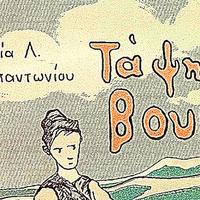14. Ένα βλαχόπουλο που δε λέει πολλά λόγια
|petit Vlach|||||
One|Young shepherd boy|||says|many|many words
|||não||muitos|palavras
14. Ein dummer Junge, der nicht viel sagt
14. A dumb kid who doesn't say much
14. Un niño tonto que no dice mucho
14. پسر بچه ای که زیاد حرف نمی زند
14. un petit garçon qui ne dit pas grand-chose
14. Głupi dzieciak, który niewiele mówi
14. Глупый ребенок, который мало что говорит
14. Fazla konuşmayan küçük bir çocuk
Ένα βλαχόπουλο έτρεχε προς τα κει, φωνάζοντας τον σκύλο.
||||||en criant||
a|young shepherd boy|was running|towards||over there|shouting at||dog
A dumb kid was running over, calling for the dog.
Έφτασε, άρπαξε τον σκύλο από το μαλλιαρό του λαιμό και, σηκώνοντας την αγκλίτσα του, έκανε πως θα τον τσακίσει στο ξύλο.
||||||poilu||||levant||||||||||bois
"Reached"|grabbed|||by|its|hairy||"hairy neck"||lifting up||shepherd's crook|||it|||break him||wooden stick
Er griff hinüber, packte den Hund an seinem haarigen Hals und tat so, als würde er ihn verprügeln, indem er seine Schnalle anhob.
He reached over, grabbed the dog by his hairy neck and, lifting his buckle, pretended to beat the shit out of him.
O σκύλος κάθισε κάτω και μαζεύτηκε.
|||||s'est rassemblé
The|The dog|sat down|||curled up
The dog sat down and collected himself.
Το βλαχόπουλο ήταν ένα παιδάκι.
|vachon|||
The|The young boy|||little child
The brat was a little boy.
O σκύλος δυο φορές σαν αυτό.
O(1)|dog|two|times|like|
The dog twice like this.
—Πού είναι η καλύβα του Γεροθανάση; ρώτησαν τα παιδιά.
|||||Gérotanassi|||
Where|||hut||Old Thanasis|asked|the|
-Where is Gerothanasi's hut? asked the children.
Tο βλαχόπουλο έδειξε με το χέρι τις καλύβες.
|le Vlachopoulos||||||
the||"showed"|with||||huts
The boy pointed to the huts with his hand.
Τους ακολούθησε, κρατώντας τον σκύλο και κατέβηκαν μαζί.
||||||sont descendus|
|followed them|holding||||came down|
He followed them, holding the dog, and they went down together.
—Τι τον έχεις εσύ τον Γεροθανάση;
|||||Gérotanassi
What|||"you"||Old Thanasis
-What's with you and old man?
—Παππούλη.
Grandpa.
-Pappouli.
—Εσύ σε ποια απ' όλες τις καλύβες κάθεσαι;
you||||all of them|which||"do you stay"
-Which of all the huts are you sitting in?
Το βλαχόπουλο απάντησε και πάλι με το χέρι.
|petit Vlach||||||
The|boy|||again|||hand
The dumbass replied again with his hand.
Το σήκωσε κι έδειξε μια καλύβα.
he|"lifted"||showed|a|
He picked it up and pointed to a hut.
Στην πόρτα στεκόταν μια κοπέλα.
||was standing||girl
There was a girl standing at the door.
Φορούσε τα τσαρούχια της, τη ζώνη της, την κεντημένη της ποδιά.
|||||ceinture|||||tablier
||traditional Greek shoes||the|her belt||the|embroidered||embroidered apron
She wore her breeches, her belt, her embroidered apron.
Pantolonunu, kemerini ve işlemeli önlüğünü giydi.
Είχε μαύρα μάτια, τα ίδια σαν του μικρού τσοπάνη.
||||||||berger
|black||||||little shepherd boy|shepherd boy
He had black eyes, the same as the little shepherd's.
—Αυτή ποια είναι; ρώτησαν τα παιδιά το βλαχόπουλο.
|||||||le petit Vlach
|||||||young shepherd boy
-Which one is she?The children asked the dumbass.
—Η Αφρόδω.
|Aphrodite
the|The Aphrodo.
-The Aphrodite.
—Αδερφή σου είναι;
Sister||
-Is she your sister?
—Χα!
Salut
Joy
-Ha!
—Έχεις κι άλλες αδερφές;
|||sœurs
||other|sisters
-Do you have any other sisters?
—Αχά!
Ah
Aha!
-Aha!
—O πατέρας σου είναι δω;
Is||||here
-Is your father here?
Το βλαχόπουλο πάτησε τη γλώσσα του μέσα από τα δόντια κι έκανε: «Τσ!»
|vachotou (1)|||||||||||tch
||bit||tongue|his|through|"through"||teeth||went "Tsk!"|"Tsk"
The dumb kid stuck his tongue through his teeth and did: "Ch!"
Δεν ήταν για πολλά λόγια.
"Not"|||many|words
It wasn't much to talk about.
Konuşacak pek bir şey yoktu.
Πρώτα έλεγε καμιά λέξη, τώρα έφτασε στο «χα» στο «τσ».
|||||||||«ts»
|"used to say"|any|word||reached||||
First he was saying no words, now he's got to "ha" to "ch".
Θα πει πως η κουβέντα έπρεπε να σταματήσει εδώ.
||||conversation||||
"Will"|"means"|that||conversation|had to||stop|"here"
Er wird sagen, dass das Gespräch an dieser Stelle hätte enden müssen.
He will say that the conversation should have stopped here.
Γιατί παραπέρα δεν είναι πια παρά τα νοήματα.
|||||||sens
|"further on"||||nothing but||meanings
For beyond is no more than signs.
---
---
Ωστόσο η καλή Αφρόδω καλωσόρισε τα παιδιά και τους είπε να περάσουν μέσα στην καλύβα.
|||||||||||passent|||
"However"|||Aphrodo|welcomed|||||||come in|||
However, the good Aphrodite welcomed the children and told them to go inside the hut.
Όταν την είδαν, ξαφνιάστηκαν.
|||ils furent surpris
||"saw her"|were taken aback
When they saw her, they were surprised.
Ήταν τόσο νοικοκυρεμένη!
||bien organisée
She was|so|so well-organized
She was so neat!
Σπίτι αληθινό.
|Real
Real house.
—Να καλύβα, Φάνη, είπε ο Δήμος, όχι σαν τις δικές μας!
||Fani|||||||our|
-A hut, Fanny, said the Municipality, not like ours!
Η Αφρόδω χαμογέλασε.
|Aphrodite|
|Aphrodite|smiled
Aphrodite smiled.
—Να είχαμε κι εμείς πρόβατα και γίδια, είπε ο Φάνης, θα ήταν κι η δική μας καλή.
||||||chèvres||||||||||
"If only"|we had|||sheep||goats|||||||||our|good fortune
-If we had sheep and goats, said Fanis, ours would be good too.
—Εσείς έχετε κάτω σπίτια, είπε η βλαχοπούλα, που είναι θεμελιωμένα.
||||||petite fille des montagnes|||fondés
You (plural)|"you have"|"down"|||||||"well-founded"
- "Ihr habt unten Häuser", sagte die kleine Bäuerin, "die gegründet sind.
-"You have houses downstairs," said the little countrywoman, "that are founded.
Κι έπειτα ξέρετε και τα γράμματα, που δεν τα ξέρουμε εμείς.
|||||lettres|||||
"And"|"and then"|"you know"|||letters||||we know them|
And then you know the letters, which we don't know.
Λάμπρο, γιατί κάθεσαι στην πόρτα; Έλα μέσα να δεις τα καλά παιδιά.
Lambros|||||||||||
"Lambro"||"are you sitting"|||Come in||||||good children
Lambreaux, why are you standing at the door? Come in and see the good guys.
—Τς!
Tss
Tss
-Tsh!
έκανε πάλι ο Λάμπρος κι έσκυψε το κεφάλι, σκάβοντας τη γη με το τσαρούχι του.
|||Lámbros|||||en creusant||||||
|||"Lambros"||bowed||head|digging into||earth|||traditional Greek shoe|
Lambros did again and bowed his head, digging the earth with his hoe.
Ύστερα πήρε την αγκλίτσα του κι έφυγε.
|took||crook|||left
Then he took his buckle and left.

